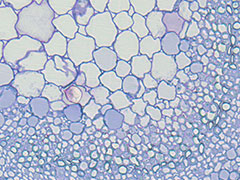Aims
The International Society of Endocytobiology (ISE) was founded in 1983 in Tübingen during the Second International Colloquium on Endocytobiology. The Society aims to promote on the one hand the research of endocytobiology and of general (endo)symbiosis, and on the other the understanding of symbiotic interactions and of antisymbiotic processes (like intertaxonic combination) at the cellular level (e.g. physiological, biochemical and genetical aspects). This field of interest embraces both the significance of these interactions for host and symbiont, and their relevance to the origin and evolution of pro- and eukaryotic cells, including exogenosomes (cell organelles like chloroplasts) and exogenons (interspecific transferred whole genes or gene fragments), and furthermore related aspects of organismic and cellular biology (e.g. differentiation, dedifferentiation and rhythms).
The aims will be promoted by holding meetings, e.g. the triannual
International Colloquium on Endocytobiology and Symbiosis,
and by publishing journals, e.g. the ISE Letters (IJECR), and the International Journal on
Endocytobiosis and Cell Research,
or the ISE News Letters (in unconstrained corollary), as well as other items. The promotion comprises additionally the improvement of education in endocytobiology and general symbiology, furthermore the support of research e.g. by encouraging the closer cooperation of those researching in the fields of interest of the Society, and last not least the awarding of outstanding scientists with the
The Society is purely scientific in purpose and there are no restrictions on membership on behalf of race, sex, political affiliation, creed, or nationality. ISE also much encourages and promotes the foundation of national sections.
